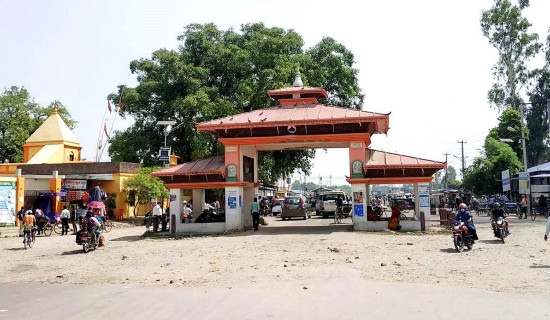- Thursday, 26 February 2026
Marking Unity Day With Ardour
The spirit of unification of Nepal that was divided into dozens of small states evolved when king of tiny Gorkha kingdom Prithvi Narayan Shah raised the flag of unity and brought together all the citizens of Gorkha. He said Nepal is the garden of all ethnic and caste groups. All the people of Gorkha gathered together and promised to fight to unite the country till their last breath. They decided to move towards Nuwakot in the east. Birag Bakheti Magar got the responsibility to conquer Nuwakot. Later on Kalu Pande was assigned this Herculean task and he got victory over Nuwakot. Gradually, Gorkhali army conquered Kathmandu Valley and the territory of Gorkha reached up to Tista River in the east. The Gorkhas under the command of Amar Singh Thapa reached Satluj River west of Kangra.
Gorkha army had to fight against the British East India Company. The British major general Sir David Ochterlony appreciated the strength and unity of Gorkha army. Nepal had to fight with Tibet/China in the north and East India Company in the south. Gorkha army demonstrated their valour not only in the war against neighbouring countries but also in two Great World Wars.
Fight for democracy
Nepalis fought for democracy many times with the cooperation and collaboration of different political parties and ethnic groups. Lakhan Thapa Magar formed an army composed of Magar, Gurung, Brahman and other ethnic groups. Scholars like saint Dildas were also in his army. Nepalis’ struggle for liberty, democracy and equality spanned over many decades.
The country’s first organised political party, Nepal Praja Parishad, was formed to fight for democracy and many youths like Ganga Lal Shrestha, Dashrath Chand, Dharmbhakta Mathema and Sukra Raj Shastri were hanged to death. Nepali Congress and Communist Parties were formed to unite all the people to establish democracy. Leaders like BP Koirala, Tanka Prasad Acharya, Matrika Prasad Koirala, Pushpa Lal Shrestha, Dr Dilli Raman Regmi and others took part in the democratic revolution that led to the establishment of democracy and downfall of Rana rule in 1951. The role of Mukti Sena (Liberation Army) of Nepali Congress was very significant in the revolution.
Leaders like Ram Prasad Rai, Narad Mani Thulung, Karndhoj Rai and many others sacrificed their lives for democracy. The decade-long Maoist armed insurgency and Royal Palace massacre brought turning points in the political history of Nepal. The CPN-Maoist signed peace agreement with the then Nepal government and joined competitive mainstream politics. Nepal was declared republic with King Gyanendra leaving the palace. Dr Ram Baran Yadav became first President and Pushpa Kamal Dahal Prachanda the first Prime Minister Republic of Nepal. Nepal became federal and secular state and President as a head of the state.
Nepal’s constitution adopted in 2015 is more inclusive in terms of appointing President and Vice President, and election of Speaker and members of House of Representatives. It also contains the provisions of establishment of various commissions to uplift the marginalised groups such as Madhesi, Tharu, Muslims, women, indigenous nationalities and disabled.
The Directive Principle, Policies and Obligation of the State of the Constitution of Nepal mentions that the citizens should keep intact the national unity while protecting the freedom, sovereignty, territorial integrity and independent of Nepal and promote the national unity while developing mutual cooperative relations between the Federal Units by maintaining mutual cohesion, harmony and solidarity between various castes, religions, languages, cultures and communities. The Fundamental Rights of the Constitution clearly state that there should be no discrimination in the application of general laws on grounds of origin, religion, race, caste, tribe, sex, physical condition, condition of health, marital status, pregnancy, economic condition, language and region, ideology or on similar other grounds.
Inclusive provisions
The national charter further elaborates that nothing shall be deemed to prevent the making of special provisions by law for the protection, empowerment or the development of the citizens including the socially or culturally background women, Dalit, indigenous nationalities, Madhesi, Tharu, Muslim, oppressed and backward classes, minorities, farmers, labourers, youths, children, senior citizens, gender and sexual minorities, persons with disabilities, incapacitated or helpless, backward region and indigent Khas Aryan. No discrimination shall be made on the ground of gender with regard to remuneration and social security for the same work. The constitution of Nepal clearly stated that the President shall promote the national unity of Nepal.
It is a matter of happiness that the government has decided to grant public holiday on Poush 27 in honour of Prithvi Narayan Shah, Nepal’s unifier and founding father. Today we are proud of being Nepalis and citizens of Nepal in the world.
For this, credit goes to Prithvi Narayan Shah who led the unification campaign and laid the foundation of modern Nepal.
He has recognised cultures, traditions and faiths of all ethnic groups so that Nepal becomes a beautiful garden of all people. Therefore, let’s celebrate Prithvi Jayanti with enthusiasm by paying tributes to the builder of modern Nepal on the occasion of his birthday that falls on today (January 11).
(The author is a historian.)
















